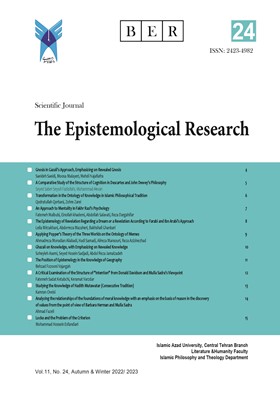Ghazali on Knowledge, with Emphasizing on Revealed Knowledge
Subject Areas : Epistemological researchesSoheyleh Asemi 1 , Seyed Hosein Sadjadi 2 , Abdol Reza Jamalzadeh 3
1 - Ph.D. Candidate of Philosophy, north tehran Branch, islamic Azad university, Tehran, Iran
2 - Assistant Professor of islamic Philosophy, north tehran Branch, islamic Azad university, Tehran, Iran
3 - jamalzadehpro@gmail.com
Keywords: knowledge, Ghazali, philosophy, Mulla sadra, moderate rationalism,
Abstract :
One of the fundamental issues in the course of human perfection is the acquisition of knowledge. The higher level of the human knowledge is, the closer its soul would be to its perfection. This important issue has made many thinkers represent their ideas. Throughout history, thinkers have presented different methods in this regard. The basic difference between these methods is the usage of religion or faith (revelation). As a result, some of these methods have an intellectual basis and some have a faithful (revelatory) basis. Among the most influential people in this process is Imam Mohammad Ghazali. The main goal of the current research is to investigate the effect of Ghazali's epistemological method on the course of philosophy by an analytical-descriptive method. This research seeks to find the answers to these questions, which epistemic method is Ghazali's statements based on? What effects has his method had on the course of philosophy, especially Mulla Sadra's thoughts? Ghazali's dealings with philosophers have brought different perceptions in a way that even some people consider him to be an anti-rational person. But his exact position deserves a more comprehensive and clear investigation. In fact, with his statements, Ghazali established a new mode of moderate rationalism among thinkers. This influence can be found in course of rationalism in philosophy and specifically in Mulla Sadra. He, in agreement with Ghazali, finds philosophical reason unable to provide opinions in all fields and considers benefiting from revelation along with relation to be the most reliable epistemological method.
قرآن کریم
ابنمنظور، ابوالفضل محمد بن مکرم. (1408 ه.ق). لسان العرب، دارحیاء التراث العربی، بیروت.
پیترسون، مایکل تاد. (1376). عقل و اعتقادات دینی، ترجمه احمد نراقی و ابراهیم سلطانی، چاپ اول، طرح نو، تهران.
خسروپناه، عبدالحسین. (1383). کلام جدید، چاپ سوم، مرکز مطالعات و پژوهشهای فرهنگی حوزه ی علمیه، قم.
داوری اردکانی، رضا. (1388). غزالی و فلسفه اسلامی، جاویدان خرد، دوره 6، شماره 3، ص87-100.
دهخدا، علیاکبر. (1377). لغت نامه، چاپ دوم، دانشگاه تهران، تهران.
راغب، اصفهانی، حسینبنمحمد. (1363). مفردات الفاظ القرآن، چاپ دوم، مکتبه المرتضویه، تهران.
الشیرازی صدرالدین محمد ابراهیم. (1981). الحکمة المتعالیة فی الأسفار العقلیة الأربعة، چاپ سوم، دار إحیاء التراث العربی، بیروت.
همو. (1341). عرشیه، ، تصحیح و ترجمه غلامحسین آهنی، مولی، تهران.
همو. (1313). شرح هدایه الاثیریه، چاپ سنگی، تهران.
همو. (1362الف). مفاتیح الغیب، تصحیح محمدخواجوی، موسسه مطالعات و تحقیقات نشر دانشگاهی، تهران.
همو. (1362ب). المبدأ المعاد، ترجمه احمد بن الحسینی اردکانی، مرکز نشر دانشگاهی، تهران.
همو. (1363). تفسیر القرآن، بیدار، قم.
همو. (1382). الشواهد الربوبیه، انتشارات بنیاد حکمت اسلامى صدرا، تهران.
صادقی، هادی. (1383). درآمدی بر کلام جدید، انتشارات سپهر، قم.
غزالی، ابوحامد محمّدبنمحمّد. (1988م). معارج القدس فی مدارج معرفة النفس، دارالکتب العلمیة، بیروت.
همو. (1361). نصیحه الملوک، تصحیح جلال الدین همایی، بابک، تهران.
همو. (1376). میزان العمل، ترجمه علی اکبر کسمایی، سروش، تهران.
همو. (1994). الجام العوام عن علم الکلام فی مجموعه سائل الامام الغزالی، دارالکتب العلمیه، بیروت.
همو. (1927). تهافت الفالسفه، تحقیق سلیمان دنیا، چاپ موریس بویژ، لبنان.
کی یرکگور، سورن. (1374). انفسی بودن حقیقت است، ، نقد و نظر، سال اول، دوره ۱، شماره 3-4، ص 68.
نصر، سید حسین. (1398). آفاق حکمت در سپهر سنت، انتشارات ققنوس، تهران.
واعظی، علی. (1385). عقل گرایی انتقادی و نقد آن، فلسفه و کلام، دوره 15، شماره 59، ص 61.
ولفسون، هاری آسترین. (1364). مباحثی درباره ظهور علم کلام، ترجمة نصرالله پورجوادی، معارف، دوره 2، شماره 1، ص۵-۶۸.
هک، جان. (1372). فلسفه دین، انتشارات بینالمللی الهدی، تهران.
Treiger, Alexander, Inspired Knowledge in Islamic Thought, Inspired Knowledge in Islamic Thought: Al-Ghazali's Theory of Mystical Cognition and Its Avicennian Foundation, Routledge.(2012).
Griffel, Frank, Al-Ghazali's Philosophical Theology, London, Oxford university press, 2009.
Frank, richard M. (1987-89). Al-Ghazalis use of Avicennas philosophy, v.55-57, p.271-285.
_||_

